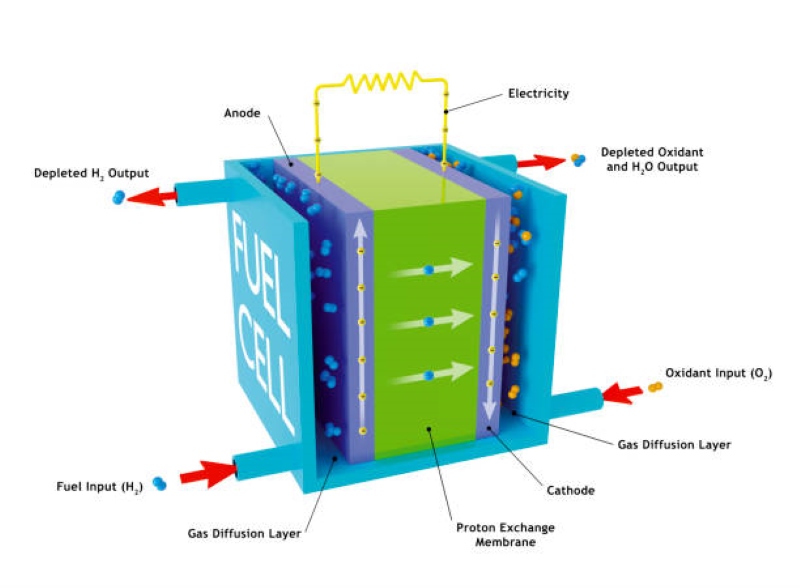What is a Fuel Cell, Difference between Fuel Cells & Batteries?

Fuel cells are advanced energy converters that offer effective and eco-friendly power. Unlike traditional combustion engines, they use chemicals that produce electricity, emitting minimal carbon footprints. This technology has huge potential for application in vehicles, small electronics, and stationary power.
Fuel cells have gained great importance because, with the world working on reducing carbon footprints, they offer high efficiency, large or small-scale applicability, and the promise of changing how energy is used.
Keep reading to learn more about fuel cells, their uses, benefits, drawbacks, etc.

Table of Contents

What is a Fuel Cell?
A fuel cell is an electrochemical cell that obtains electrical energy from fuel through a chemical reaction. Maintaining the progress of these reactions, which produce electricity, requires a continuous supply of fuel and mostly an oxidising agent, usually oxygen. Therefore, if a fuel cell has fuel and oxygen, it can continue to generate electricity.
Today, they have become widely used as primary or secondary power sources of great facilities like industries, commercial buildings, and even residential building markets. Like an electrochemical cell, they have a cathode and an anode with an electrolyte that provides the medium for moving protons inside the cell.
What is the Fuel in a Fuel Cell?
The fuel in a fuel cell is the substance that undergoes a chemical reaction in order to produce electricity. Hydrogen, methanol, natural gas, and biomass-derived fuels are common fuels that feed fuel cells. Hydrogen is mainly chosen due to its high energy content and clean combustion.
Other fuels, such as natural gas, methanol, ethanol, and even biomass-derived fuels, can also be used in other forms of fuel cells. Each of these types of fuel cells has its own peculiarities in terms of efficiency, cleanliness of output, and the associated infrastructure burdens regarding storage and distribution.
What is a Fuel Cell System?
A fuel cell system would include the complete setup: a stack and all associated components and subsystems that make it operational. This may include units for processing fuel to make it useable within the cell, compressors or blowers that provide the needed oxygen or air to the cell, heat management systems for temperature control, and controls and electronics that monitor performance and optimise where possible.
Basically, it is a system designed to efficiently turn the chemical energy of the fuel into electrical energy, with heat and water often added as by-products dependent on the fuel and type of fuel cell used.
How Do Fuel Cells Work?
Fuel cells operate somewhat like batteries, except that they never "die" or need recharging. As long as fuel is supplied, they continually produce electricity and heat. A basic fuel cell has two electrodes, an anode and a cathode, connected by an electrolyte. For example, hydrogen is supplied to the anode, and air is supplied to the cathode.
In a hydrogen fuel cell, an anode catalyst breaks down hydrogen molecules into protons and electrons, which take two different routes to the cathode: the electrons are transferred through an external circuit that provides an electric current, while the protons advance through the electrolyte. These join oxygen and electrons at the cathode to make water molecules, releasing heat into the environment.
The carbonate fuel cells operate at a high temperature, about 1000 degrees Fahrenheit. At this high temperature, electrode reactions can occur efficiently without using expensive platinum-type catalysts.
In addition, this temperature is hot enough to convert methane to hydrogen (reforming) inside the fuel cell stack itself. This allows the cell to generate hydrogen directly from a methane-based fuel source, such as natural gas or biogas.
What are the Types of Fuel Cells?
Various types of fuel cells are available. These include:
1. Alkaline Fuel Cells
Alkaline fuel cells use an aqueous solution of either sodium hydroxide or potassium hydroxide as the electrolyte, hydrogen gas as the fuel, and oxygen as the oxidiser. If the oxides are efficiently removed, zinc or aluminium May serve as an anode.
The cells typically operate below 100°C and include metals and selective plastics, while the electrodes could be carbon or nickel. As a reaction product, water is removed from outside the system by boiling out of the electrolyte.
2. Phosphoric Acid Fuel Cells
Phosphoric acid fuel cells can operate at temperatures up to 200 °C (400 °F) with an electrolyte of orthophosphoric acid. They can use hydrogen fuel mixed with carbon dioxide, air, or oxygen as an oxidiser.
The electrodes are made of catalysed carbon and are placed in pairs facing each other to form a series circuit. These fuel cells have been tested on a small scale for local power stations and remote generators.
3. Molten Carbonate Fuel Cells (MCFCs)
Molten carbonate fuel cells have been reported to work at high temperatures, normally about 600-700°C, with the electrolyte as a molten carbonate salt mixture.
They have been reported to show a high efficiency of about 60% and can run on different fuels such as natural gas, biogas, and other hydrocarbons.
MCFC's biggest application is for stationary power generation, where heat output is used in cogeneration or combined heat and power systems.
4. Solid Oxide Fuel Cells (SOFCs)
Solid oxide fuel cells work at even higher temperatures, typically more than 800-1000°C, and the usual electrolyte is ceramic, often based on zirconium oxide-based materials. The feature of SOFCs means that, with very different fuels, they can direct conversion with high efficiency, sometimes reaching up to 60% in power generation.
Their uses include being applied in stationary power generation systems, residential combined heat and power systems, and commercial combined heat and power systems.
5. PEMFCs: Solid Polymer Electrolyte Fuel Cells
Solid polymer electrolyte fuel cells, or proton exchange membrane fuel cells, also work at lower temperatures—on the order of 50–100°C—with a solid polymer membrane, typically Nafion, as the electrolyte. PEMFCs, powered by hydrogen fuel, have become quite popular due to their zero emissions and high efficiency in directly converting chemical energy into electricity.
What are the Uses of Fuel Cells?
Fuel cell technology is used in many different ways. Following are the applications and uses of fuel cells:
- Stationary Power Generation: Provide sufficient electricity for homes, businesses, and remote areas with restricted access to the grid.
- Transportation: The emergence of fuel cell vehicles (FCVs) provides clean and efficient mobility, ensuring less dependence on fossil fuels.
- Backup Power Systems: Ensures continuous electricity supply during grid outages, which institutions like hospitals, data centres, and telecommunication facilities require.
- Aerospace: Fuel cells provide power to satellites and spacecraft due to high energy densities and reliability.
- Military Applications: Fuel cell is used to operate military vehicles, submarines, and remote bases.
- Material Handling: Forklifts and warehouse equipment are powered by fuel cells, which reduces the impact of emissions and operational costs.
- Remote Monitoring Stations: Fuel cell supplies the most reliable power to remote weather stations, environmental monitoring systems, and research outposts.
- Marine Applications: Fuel cells power boats and ships, reducing pollution in marine environments compared with traditional diesel engines.
What are the Advantages of Fuel Cells?
Here are the common benefits of fuel cells:
- High Efficiency: Fuel cells have the potential to achieve 40% or even more than 60% efficiency in converting fuel to electricity, depending on the type and intended application.
- Zero Emissions: Fuel cells, which use hydrogen as fuel, produce only water vapour and heat, making them eco-friendly.
- Quiet Operation: Fuel cells operate quietly compared to internal combustion engines; the noise factor is minimal, thereby providing reduced noise pollution.
- Modularity: It means they can be scaled from small portable devices to large power plants, thus offering flexibility in deployment.
- Longer Run-Time: Fuel cells can generate power continuously for a long period; thus, they find applications where the supply of electricity is crucial and uninterrupted.
What are the Disadvantages of Fuel Cells?
Following are the major drawbacks of fuel cells that you must be aware of:
- Expensive: Fuel cell systems bear large setup costs that are usually more expensive than conventional technologies, thus curbing their wide-scale adoption.
- Hydrogen Infrastructure: The limited hydrogen production, storage, and distribution infrastructure restricts fuel availability in most regions.
- Durability and Maintenance: Some fuel cell types require periodic maintenance or have limited lifetimes, which affects their whole-life cost-effectiveness.
- Fuel Storage and Safety: Hydrogen gas is highly inflammable, and hence, its storage can cause safety problems and requires special conditions for storage and handling.
- Complexity: Any fuel cell systems are complex, and the need for sophisticated control systems will increase operational and maintenance requirements compared with simpler technologies.
What are the Differences Between Fuel Cells and Batteries?
Here are the key differences between fuel cells and batteries:
What is a Hydrogen Fuel Cell?
A hydrogen fuel cell is an electrochemical device that changes the chemical energy of a reaction between hydrogen and oxygen to electricity, heat, and water without combustion. Hydrogen flows through an anode and oxygen through a cathode; in between, an electrolyte enables the ion exchange. These cells produce electricity in applications ranging from powering vehicles to fixed power generators.
What is a Fuel Cell Motor Vehicle?
Fuel-cell motor vehicles use hydrogen fuel cells to generate electricity to power electric motors, offering emission-free driving. While other electric vehicles draw their electricity only from a battery, the electricity in FCEVs is produced by a fuel cell powered by hydrogen. Tata Starbus is India's first Hydrogen Fuel cell-powered EV.
Examples of Fuel Cell
Here are some examples of different types of fuel cells:
Proton Exchange Membrane Fuel Cell (PEMFC): Used in transportation applications like cars, buses, and forklifts and also in stationary applications like backup power systems of buildings.
Solid Oxide Fuel Cell (SOFC): It finds applications in stationary power generation. CHP systems and military applications
Molten Carbonate Fuel Cell MCFC: Primarily used in stationary power generation and combined heat with power applications.
Direct Methanol Fuel Cell (DMFC): Used in portable applications, for example, in small electronic devices, and under study as a potential power source for cellular phones.
Alkaline Fuel Cell (AFC): Used in space missions—NASA—and now finding niche applications in underwater vehicles and some stationary power applications.
Phosphoric Acid Fuel Cell (PAFC): Used for stationary power generation in buildings and utility plants.
Fuel cells are one of the more promising technologies in alternative energy. They offer the potential for clean and efficient generation of power. The power generation operative is applicable to various industries, from transport to stationary power generation.
With continued research and development within this industry, fuel cells will undoubtedly form key building blocks of future energy structures through their clean, efficient, and versatile solutions across various sectors.
















